- Home
- Georgette Heyer
Acting on Impulse Page 4
Acting on Impulse Read online
Page 4
He struggled up awkwardly.
“I hope I’m not trespassing,” he said. “I thought the woods were not private?”
She danced back a few paces.
“Oh, no! Not private now.”
She laughed again, pointing her tiny foot.
“They were once, I suppose?” he asked for want of something better to say.
“Yes—oh, yes! A long, long while ago.”
She came back to him, seeming hardly to touch the ground, so light was she. She hesitated a moment and sat down on the bank. She stretched out her hand in a shy, inviting gesture. Peter obeyed the summons and sank down beside her. The little lady possessed an odd magnetism; he found himself drawn to her almost irresistibly.
“D’you live here?” he inquired, smiling at her.
Her eyes flew up to his and he saw his smile reflected in their wistful, blue depths.
“No, not now. They all went away,” she said sadly. “I only come here sometimes. Once I lived here.”
She made a gesture with her hand, embracing the wood. His smile grew.
“What, in the wood?”
The rippling laugh bubbled up again.
“Oh, no! Over there.” She pointed, and his eyes followed the direction of her finger.
“There? Carbury Place lies that way, doesn’t it?”
She clapped her hands.
“That is it!”
“Then you are a Dering?”
She shook her head.
“No. I am Bride. Only I never was one,” she added, sighing.
“Bride. What an unusual name! I beg your pardon. That was rather rude of me! Does it mean Bridget?”
“No. Oh no! Just Bride.”
He did not wish to appear inquisitive, so he did not question her any further. They sat in silence for a while till she looked up and spoke again.
“Everything has changed,” she said, “but the beechwoods are always the same.”
“Do you come here often?” he asked.
“Not now. I used to—oh, very often! But now hardly at all. Only when I am wanted.”
The friendly, shy smile peeped out. He came to the conclusion that she was younger than he had thought.
“When you're wanted?” he repeated. “How can you tell when that is?”
“I can’t tell. I just know. I felt to-day that someone needed me, so I came, and then, of course, I found you. You want me, don’t you?”
“I?” he said, taken aback. He looked down at her sharply, but there was no suspicion of coquetry in her face. She spoke, too, as if she were stating a natural fact. “I want you?”
“Yes. You do, don’t you?”
He laughed.
“You quaint child! Why should I want you?”
“Because you’re so unhappy,” she answered simply.
He started.
“How do you know that?”
She smiled wisely, tenderly.
“I always know. Tell me.”
“Tell—” In spite of himself he was amused. “My dear little girl, why should I?”
“Because I came to help you,” she said.
“Very nice of you, I’m sure!” he replied. “But I’m not in the habit of pouring forth my woes to chance acquaintances.”
He laughed shortly and bitterly. A shadow seemed to cross her face.
“Ah, you don’t want me after all!” she said wistfully. She rose. “Good-bye!”
Suddenly he felt an overwhelming desire to keep her beside him.
“Oh, don’t go!” he cried. “Forgive me! I didn’t mean to be so boorish! Fact of the matter is—I’m going through a—rather bad time. My own fault, I suppose.”
She was on tiptoe, hesitating.
“Please!” he said. “Don’t go!”
The elfin smile danced across her eyes. She sat down again.
“No, I won’t go. Not yet. Tell me what is the matter.”
“I should bore you—horribly,” he said diffidently. “Besides, it’s such an extraordinary thing to tell a stranger—”
“Ah, but I am not like other people!”
“No, you’re not,” he said, considering her. “It’s a curious thing, but I feel as if I’d known you all my life.”
She nodded, full of understanding. He started to snap a twig into little pieces, not looking at her.
“It's—a quarrel,” he said with difficulty. “I quarrelled with—the lady—who was—to have been my wife.”
“Ah!”
It was a sobbing sigh. He glanced up, flushing, and saw that her eyes were full of tears.
“I say, you mustn’t cry!” he exclaimed. “After all—it’s my funeral.”
She shook her head, smiling through her tears.
“I was crying for myself,” she explained. “Why did you quarrel?”
“Blessed if I know!” he said ruefully. “I think we were both fed up—out of sorts. ’Twasn’t my fault," he added sulkily. “I didn’t start the thing.”
“No! Go on.”
“There’s not much more. She—chucked my ring at me—and I came away. Down here. I’ve been here a week. Silly sort of tale, isn’t it?
“Oh, the pity of it!” she sighed. “Do you love her still?”
He reddened, fidgeting with the twig.
“Yes. Can’t help it.”
She stretched out her hand, supplicating.
“You’ll go back, won’t you?”
He did not answer. Her fairy-voice held a quivering note of tragedy.
“If you only knew! The heartache, the remorse. Just a quarrel—a lover’s quarrel—and everything at an end?”
“I’m not going to go back and grovel,” he muttered, still sulky. “I’ve got some pride left.”
“Only pride. To break both your hearts.”
He turned.
“You speak—as though you understood,” he said wonderingly.
She nodded.
“So well—oh, so well! I quarrelled, too, you see. I didn’t think it was my fault; he didn’t think it was his. And we were both proud. I never saw him again.” Her long lashes were glistening, but she shook away the tear-drops. “Oh, that was long, long ago!” She held out her hands to a dragon-fly that darted past. “Too long to remember now.”
“I say, I’m awfully sorry!” Peter stammered. “Was he—did he—”
She was stroking the moss with fingers that trembled.
“He was killed,” she whispered.
“I’m most awfully sorry!” he repeated. “In the war?”
“Yes. In the war. But it’s so long ago.”
He thought she was perhaps a little mad.
“I’d no right to tell you my wretched trouble. It has upset you.”
“Oh, no, no! Why, I shouldn’t have come if you had been happy.”
“Wouldn’t you? Don’t you talk to happy people?”
“They don’t need me, you see,” she explained. “I only come here to help those who want me. Because my own heart broke and it hurts me—oh, so terribly!—to see things go wrong between other lovers.”
“You dear little lady! D’you know what you reminded me of when you first appeared?”
She looked inquiring.
“No? A dancing flower, perhaps. I was called that once.”
“It suits you. No; I thought you had stepped from the pages of Jane Austen. But, of course, your hair is short.”
Her hands flew to her head; her eyes crinkled charmingly at the corners.
“They cut it off. When I was ill, you know. After—after I knew that he was killed.”
“It’s topping. It never grew again?”
“No. Something happened, and I was different.”
Her eyes became grave again, even a little shrinking. He put out his hand to lay it on hers, but she eluded him, and sprang away.
“Oh, no, you must not touch me!”
She danced back, sparkling with laughter.
“Mustn’t I? Why not?”
“You couldn�
�t, and you wouldn’t understand. I am only a ghost, you see. You might be frightened of me. People are, and that hurts so. They think I am mad. But I’m not. Oh, I’m not! I’m just—dead!”
“Poor little will-o’-the-wisp!” he said gently. “Come and sit down. Don’t be frightened. I promise I won’t touch you.”
She drew nearer, her head tilted to one side.
“I mustn't stay. I ought to go now.”
“Oh!” Disappointment sounded in his voice. “Don’t go yet!”
“Ah, but I must! I only came to comfort you. And I have done that, haven’t I?”
He rubbed his forehead.
“Yes. Funny. 1 didn’t think anything could comfort me. Are you a wizard, little lady?”
Her laugh tinkled out.
“Oh, no, I am just Bride! You’ll go back, won’t you?”
His face clouded over.
“I don’t see how I—”
“Please, please! Does it matter whose fault it was, after all?
“She may not want me to go back.”
“Oh, yes, yes! You will go—you must go!”
“She said she never wanted to set eyes on me again.”
“She didn’t mean it. Never, never!”
She shook her little head till the curls danced.
“How do you know?”
“It was just a quarrel,” she said softly. “She will be so sorry—as you are.”
An unwilling smile came to his lips.
“Oh, so you know that, too, do you?”
“Of course,” she answered gravely.
“I expect you think me a pig-headed fool.”
“No. Only mistaken. Please say you will go back. There’s so much unhappiness—so much.”
He got up, throwing away the broken twigs.
“I will go back. It’s frightfully nice of you to bother about me. You’ve helped no end. I was a fool. I knew it, really; only I had to have you point it out to me. Thanks most awfully!” He held out his hand, but she skipped away, laughing. His face fell.
“I say — aren’t you going to shake hands?”
“No. Oh, no!” Her fingers fluttered to her lips, twice. “There—and there!”
He followed her.
“I shall see you again, sha’n’t I? I’d like to tell you if it’s all right, and thank you.”
“No, I sha’n’t come again. You’re happy now, and you don’t need me. Good-bye.”
He expostulated.
“You don’t really think me such an ungrateful brute? Of course I want you.”
She smiled, shaking her head. Then she curtseyed and ran into the undergrowth. The leaves fell back into place, screening her from his sight. Once again, from a long way off, came the sound of fairy laughter. Then all was quiet.
The wood seemed desolate suddenly. Peter stood for a minute, listening. Then he sighed and went back along the cutting through which he had come.
II.
PETER was shown into the drawing-room. He went over to the window and fidgeted. Presently the door opened, and Ruth came in. She paused on the threshold, rather pale. Peter stepped forward.
“Ruth, it was all my fault! I’m awfully sorry! Can’t—can’t we be friends again?”
She gave a little cry, and ran to him.
“Oh, no, it was my fault! I don’t know what possessed me. Oh, Peter, Peter!”
She buried her face on his shoulder, half laughing, half crying, and for a long while remained so, clinging to him.
Later, seated side by side on the sofa, Peter told her of the little lady in the wood. She listened, her hands in his, and at the end of the story her eyes were wet.
“Poor little lady! She just disappeared? She didn’t come back?”
“No. She dived into the bushes, laughing. She had the most extraordinary laugh, Ruth. Like tiny silver bells, only that sounds rather rot. Frightfully fascinating, and a bit—what shall I call it?—elfin. She had an elfish little face, too.”
“I wonder who she was? She didn’t tell you her name?”
“No. At least, yes. She said her name was Bride, and that she used to live at Carbury Place. By the way, darling, that’s a topping old house! You've no idea what a lovely part of the world it is down there. I’m going to take you one day. It’s not far, though I spent hours getting there.” He laughed. “I haven’t the vaguest notion as to how I managed to get so hopelessly lost!”
She reached up her hand to stroke his face.
“I have,” she said. “Poor old Peter! Oh, my dear, I thought you’d never come back!”
“Sweetheart!” He caught her to him.
A LADY and gentleman walked into the parlour of the Three Fishers’ Inn. The land-lady, Mrs. Tippit, came forward. She recognised Peter, and dropped a bob-curtsey, smiling.
“It’s pleased I am to see you, sir!”
Peter shook hands.
“I’ve brought my fiancée down to lunch, Mrs. Tippit.”
Mrs. Tippit dropped another curtsey.
“Eh, dear!”
She beamed upon Ruth, who blushed a little, and dimpled.
Peter struggled out of his light overcoat.
“Mrs. Tippit, I wonder if you could help us? We want to find a certain lady whom I met in the woods when I was staying here. ’Fraid I can’t tell you much about her, ’cept that she was young, with short curls, and dressed in a rather eccentric way.” He tossed his motoring-gloves on to the table. “She said she used to live at Carbury Place. Oh, and her name was Bride! Does that convey anything to you?”
The landlady placed a chair for Ruth, and shook her head with a short sigh.
“Ah, sir! So you met Miss Bride? Everyone knows her, poor little lady. You understand, sir, that she’s—” Mrs. Tippit touched her forehead significantly. “Not—not quite mad, sir, if you know what I mean, but sort of soft, as we say in these parts.”
Peter sat down on the edge of the table.
“Yes. I guessed that, of course. She did me a jolly good turn, and I want to find her. Where does she live, and what is her name?”
“Flower, sir. She’s Colonel Flower’s daughter. Him that used to own the Place, before the war." Mrs. Tippit sighed again. “County, sir. Not like the present owners. They made their money in soap, or jam, I forget which. Colonel Flower had to sell the Place during the war. It were a ter’ble blow, sir, I give you my word. Carbury Place had been in the family for generations, you see. They live at Red Roofs now. About a mile to the west of the Place.”
“Poor things! I wonder they can bear to remain here, and see their old home in other hands,” said Ruth. “I know I couldn’t.”
Ever ready to gossip, Mrs. Tippit sat down opposite Ruth, and smoothed out her apron.
“It was all on account of Miss Bride, ma’am. You see, after Captain Jermyn was killed—”
“Captain Jermyn?”
“That would be her lover. You know, Ruth,” interposed Peter softly.
“You’re right, sir. Captain Jermyn was engaged to Miss Bride. The handsomest, jolliest gentleman you could wish for! He always had a smile for one, an’ was that kind-hearted—well! Everybody said about here that you couldn’t find a nicer couple than our Miss Bride and Captain Jermyn. And then they went and quarrelled, sir! No one thought much of it at the time. We all saw the captain go away in his car, scowling fit to die. But, as I said to my husband, lovers’ quarrels end in kisses.” Mrs. Tippet shook her head sadly. “This one didn’t. He never came back. I think he was too proud, and as for Miss Bride— She was as gentle as you please until you happened on that pride of hers. Touch her there, and—my word! Well, all I know is that Captain Jermyn never came here again and Miss Bride never spoke his name! Just held her pretty head high, and pretended not to care. Then the war came, and nat’rally Captain Jermyn, being a Regular, was one of the first to go out. A change came over Miss Bride then.” Mrs. Tippit touched her eyes with a corner of her apron. “Poor, sweet little thing! I remember her coming here and saying to me in he
r pretty voice, “I’ve written to Anthony, Jessie.” Bless her! She’d be sure to tell me one of the first, me having maided her when she was a child. She’d written to beg his pardon, ma’am. An’ the very next day there was a notice in all the big newspapers to say that he was reported missing.”
“Oh,” Ruth slipped her hand in Peter’s. “How dreadful!”
“You may well say so, ma’am. From that day onward Miss Bride changed. It came gradual, but very soon we all knew that her brain was—was queer. Not exactly mad, just queer, like a child, sir. When the news came at last that Captain Jermyn had been killed, it seemed hardly to touch Miss Bride. All she said was, ‘It’s so long ago! So long ago! Too long to remember now!’ over and over again, till I could have cried to hear her. Then the smash came, and Colonel Flower had to sell the Place. They didn't dare leave the neighbourhood, because Miss Bride was always wandering through the beechwoods, where she and the captain used to sit. They did try to take her away, but she fretted herself sick, and they had to come back. They took Red Roofs—that was when Miss Bride was so ill, and they cut off her hair. They’ve been there ever since.”
She stopped, looking inquiringly at Ruth, who had drawn closer to Peter.
“Peter, we might have—”
She shuddered.
“Sh!” commanded Peter, squeezing her hand. “Mrs. Tippit, which is the quickest way to get to Red Roofs?”
“Your quickest way to find Miss Bride, sir, is to go through the woods. She’s more likely to be there than anywhere. If she isn’t, you've only to keep on towards the west, and you'll come to Red Roofs. ’Twon’t take you long. By the time you’re back, I’ll have lunch ready for you. A nice chicken, sir, with a raspberry pie to follow. It’s in the oven now.”
“Topping!” said Peter. “I’ll leave it all to you, Mrs. Tippit.”
“An’ you couldn't do better,” said the beaming landlady.
III.
THEY went through the beech-wood, hand-in-hand, along the same cutting that Peter had trodden a fortnight before, in a mood so black that he had not smiled when a bob-tailed rabbit scuttled comically across the path. He and Ruth went slowly now, and their conversation was very private.
Seated on the stump of a tree, against a background of soft green foliage, they found Bride twining daisies into a long chain. She looked up at the sound of footsteps, and the daisies tumbled to the ground as she sprang to her feet. She would have run away into the bushes, had not Peter stepped forward with hands outstretched.

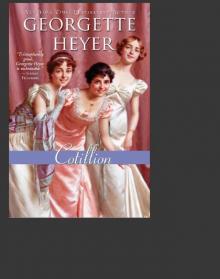 Cotillion
Cotillion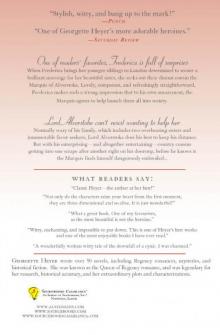 Frederica
Frederica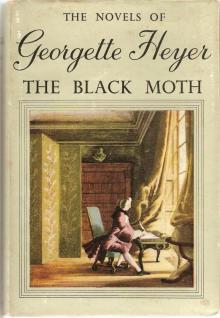 The Black Moth: A Romance of the XVIIIth Century
The Black Moth: A Romance of the XVIIIth Century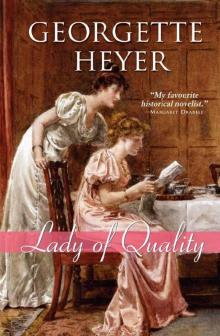 Lady of Quality
Lady of Quality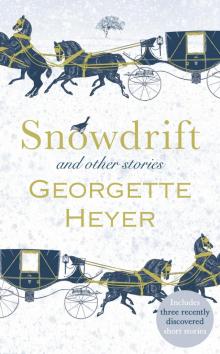 Snowdrift and Other Stories
Snowdrift and Other Stories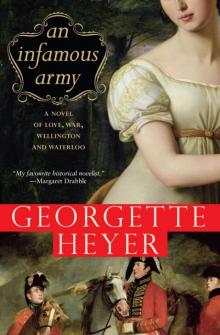 An Infamous Army
An Infamous Army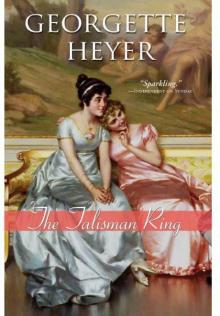 The Talisman Ring
The Talisman Ring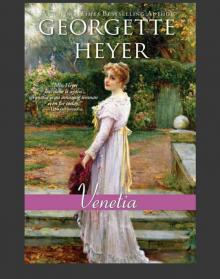 Venetia
Venetia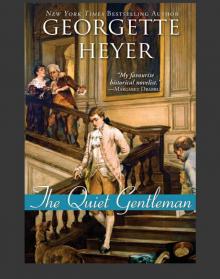 The Quiet Gentleman
The Quiet Gentleman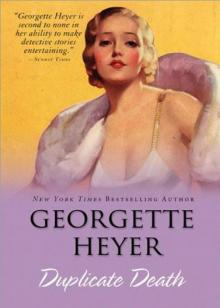 Duplicate Death
Duplicate Death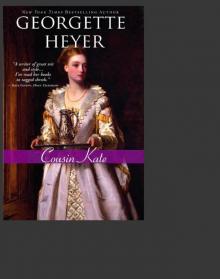 Cousin Kate
Cousin Kate Black Sheep
Black Sheep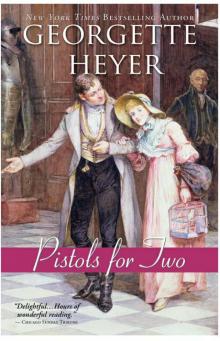 Pistols for Two
Pistols for Two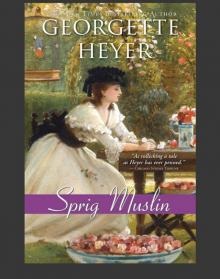 Sprig Muslin
Sprig Muslin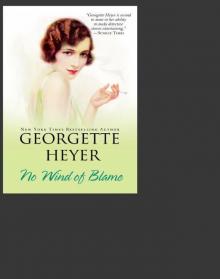 No Wind of Blame
No Wind of Blame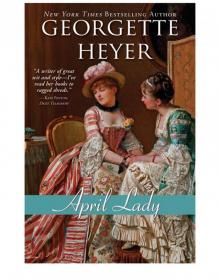 April Lady
April Lady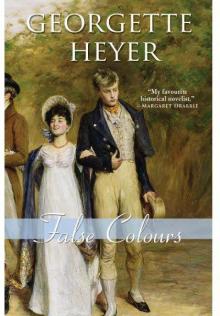 False Colours
False Colours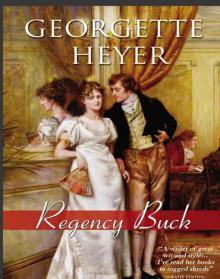 Regency Buck
Regency Buck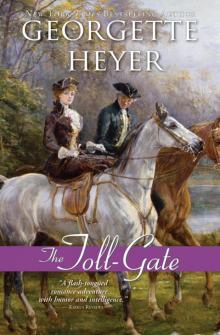 The Toll-Gate
The Toll-Gate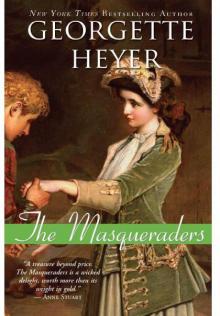 The Masqueraders
The Masqueraders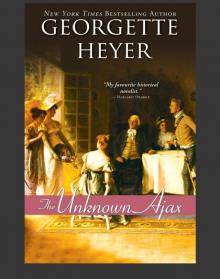 The Unknown Ajax
The Unknown Ajax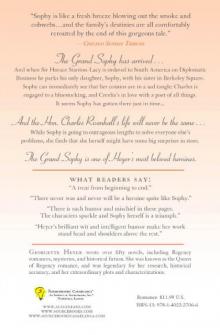 The Grand Sophy
The Grand Sophy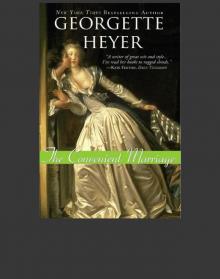 The Convenient Marriage
The Convenient Marriage Faro's Daughter
Faro's Daughter The Conqueror
The Conqueror The Foundling
The Foundling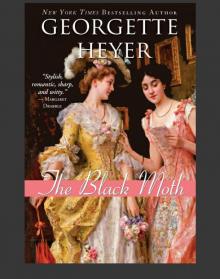 The Black Moth
The Black Moth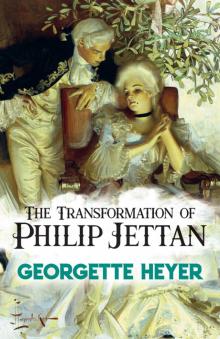 The Transformation of Philip Jettan
The Transformation of Philip Jettan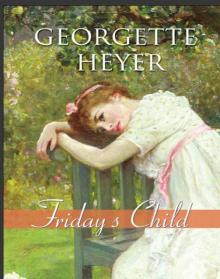 Friday's Child
Friday's Child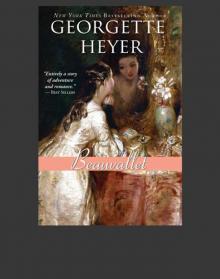 Beauvallet
Beauvallet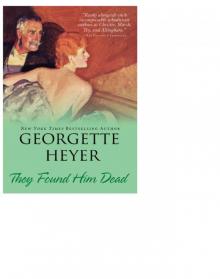 They Found Him Dead
They Found Him Dead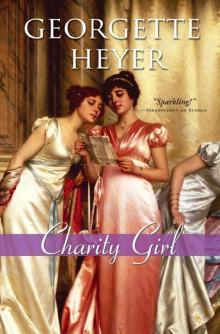 Charity Girl
Charity Girl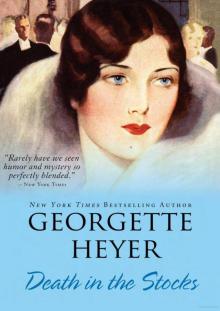 Death in the Stocks: Merely Murder
Death in the Stocks: Merely Murder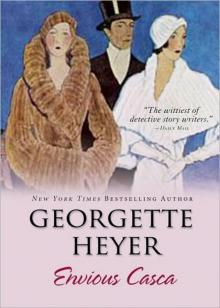 Envious Casca
Envious Casca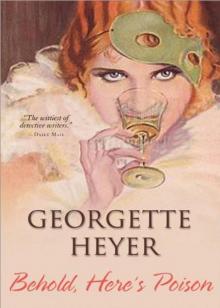 Behold, Here's Poison
Behold, Here's Poison Arabella
Arabella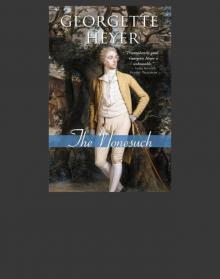 The Nonesuch
The Nonesuch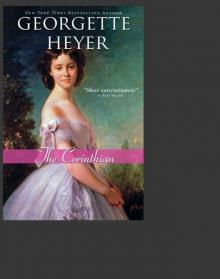 The Corinthian
The Corinthian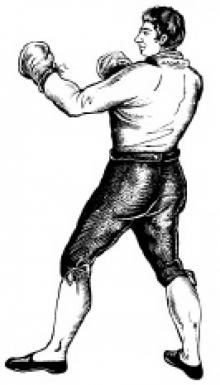 Jennifer Kloester
Jennifer Kloester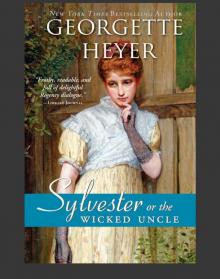 Sylvester
Sylvester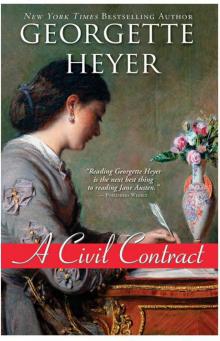 A Civil Contract
A Civil Contract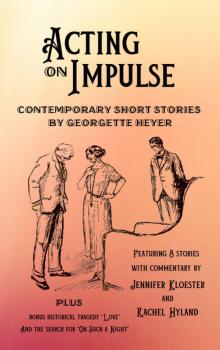 Acting on Impulse
Acting on Impulse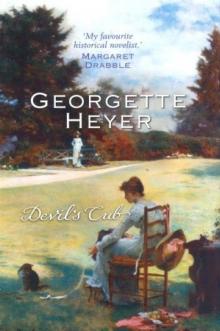 Devil’s Cub at-2
Devil’s Cub at-2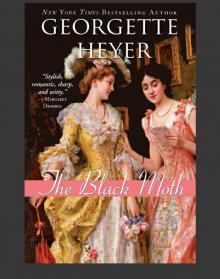 Black Moth
Black Moth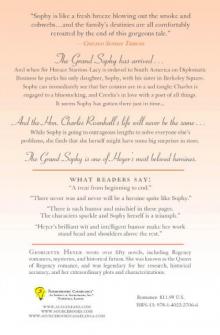 Grand Sophy
Grand Sophy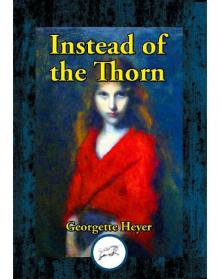 Instead of the Thorn
Instead of the Thorn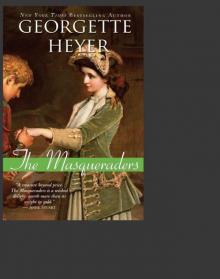 Masqueraders
Masqueraders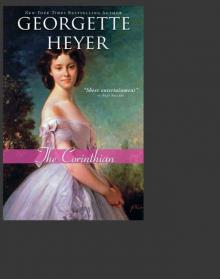 Corinthian
Corinthian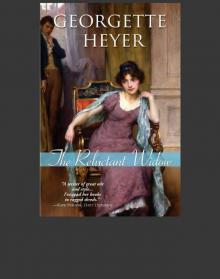 Reluctant Widow
Reluctant Widow